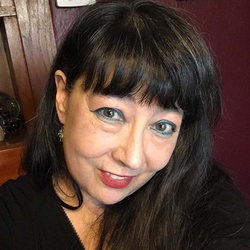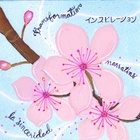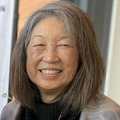We are honored to present three pieces here from South Dakota State Poet Laureate (2015-2019), Lee Ann Roripaugh. A personal and clanging reflection on the 2011 Tōhoku tsunami and earthquake, these poems are stunning murmurations of memory hitting against bone, of shadows that never quite evaporate, of ghosts alive and well in our presence. Enjoy…
—traci kato-kiriyama
* * * * *
Lee Ann Roripaugh’s fifth volume of poetry, tsunami vs. the fukushima 50 (Milkweed Editions, 2019), was named a “Best Book of 2019” by the New York Public Library, selected as a poetry Finalist in the 2020 Lambda Literary Awards, cited as a Society of Midland Authors 2020 Honoree in Poetry, and was named one of the “50 Must-Read Poetry Collections in 2019” by Book Riot. She is the author of four other volumes of poetry: Dandarians, On the Cusp of a Dangerous Year, Year of the Snake, and Beyond Heart Mountain. Winner of the Association of Asian American Studies Book Award in Poetry/Prose for 2004, and a 1998 winner of the National Poetry Series, she was the South Dakota State Poet Laureate from 2015-2019. Roripaugh is a Professor of English at the University of South Dakota, where she serves as Director of Creative Writing and Editor-in-Chief of South Dakota Review.
animal portents foretell the rise of tsunami
when elephants kneel
pressing their trunks
down to the ground
like seismic antennae
when mole rats head-drum
adumbrations / listen for
predictions / augured jawbones
snugged to tunnel walls
when cats spill from windows
slip through opened doors
some welder’s torch sizzle
fizzing the tips of their whiskers
when insect swarms clot the shore
in a frantic tangled macrame
and hippopotamuses bellow
a chorus of mournful cellos
when snakes awaken
from hibernation / curlicuing
up from their dens
like bolts come unscrewed --
their frozen bodies
a semiology of hieroglyphs
in the snow:
takadai ni tatsu
takadai ni tatsu
takadai ni tatsu
hayaku nigeru
when double-helixes spun by skeins
of flying sparrows unravel
when centipedes appear
in rippling synchronicities
when colonies of toads erupt
like burst popcorn
from ponds’ silver foil
when fish come unschooled
when bees abandon their queens
flee their honey
when silky clusters of bats lift
in smoky volcanic furies as if
rising / from a city ravished / in flame
white tsubame
after the tsubame disappeared,
white feathers started sprouting
from my shoulders and back
in a furious itch of stiff follicles,
the weird tickle of snowy down
it all began when more and more
damaged butterflies appeared
with stunted or crumpled wings
and the stained glass windows
of cicadas’ wings turned into
a tangled lace mesh crocheted
by a bent, contaminated hook
soon the hypnotic thrum
and drone pulsing the horizon
during late summer nights
fell silent: no power-tool surge
of cicadas, no squeak-shined
scrubbing or tambourine jingle
from the katydids and crickets
the gwa gwa gwa of frogs
stopped from invisible ponds
and even towns just outside
the nuclear exclusion zone
became ghost towns, too,
when barn swallows lost
all of their blues, turning
into albino ghosts, before
abandoning their mud nests
tucked under house eaves,
leaving them to decay until
all of the birdsong was gone
and everything was irradiated
by a blinding wash of silence
my parents begged me
to tell no one about
the white swallow wings
feathering my back
my father worked for TEPCO
cleaning up radioactive topsoil
in the no go zone
and didn’t want any trouble
my mother was worried
I’d be shunned as damaged,
so she bound down
my wings every morning
until they ached under gauze
and I felt crumpled
and stunted as one of
the deformed butterflies,
or the pruned-down bonsai
my grandfather in Ukedo
trained to grow into
strange transfigurations
before my grandfather
disappeared during the tsunami
I visited him every year
during amba matsuri—
the festival of the safe wave
I loved how he split open
fresh salmon with a silver
fish knife to squeeze out
sticky orange roe directly
onto hot rice for breakfast
now coastal fishing boats
rock crippled in their harbors,
crumpled sails pinned down,
going on fake runs, only
so scientists can test
for cesium levels in the fish
my wings grow larger
and more unwieldy, become
difficult for me to hide
underneath my hoody
sometimes I stand on the roof
of the tallest building
in Minamisoma and think that
if I jumped, then everyone
would finally know the truth
barn swallows are said
to be harbingers of luck
so maybe I could be like
the tsubame who returns,
bearing good fortune
I could fly across the river
looping over water
bright with the hot swirl
of irradiated golden carp
I could fly all the way
across the border patrols
into the no go zone
I could fly all the way
back to Ukedo to search
for my missing grandfather
because ever since
the insects died off
and stopped their singing,
I can hear his lost
and desecrated bones
tapping out an SOS
into the too-quiet nights:
please help me
I am lost
please help me
I am lost
ghosts of the tohoku coast
of course, the ghosts are everywhere:
the face that blooms confused
in an unfurling peony bud
the dog who doesn’t know it’s dead
returning to search for the child
who used to pet and play with it
the fisherman who comes to shore
with early morning’s neatly mended nets
looking for his small docked boat
taking taxi rides / wanting to go home
demanding to know: am I still alive?
oyurushi / oyurushi
whisked tea leaves whispering
from the bottom of a cup
the dancing funnel cloud of dust
that rises from a beaten futon
a murmuration of tiny gnats
helixing up like incense from
shriveled fruit at the broken altar
the jumble of unsortable bones
dustpanned out to sea
the husband / the wife
the mother / the daughter
the son / the father
the sister / the brother
all searching for what’s been lost
driven by the electric pain
of phantom limbs
seizing up like dowsing rods
the grief of empty cicada shells
for what’s been torn out trying
to fill themselves back up
with the transparency of rain
how many centuries will it take
for these stricken mists
and fogs to be burned away?
for this haunted water
to evaporate / to be exorcised
and rinsed clean again by light?
*These poems are from tsunami vs. the fukushima 50, Milkweed Editions, 2019 and copyrighed by the author.
© 2019 Lee Ann Roripaugh








